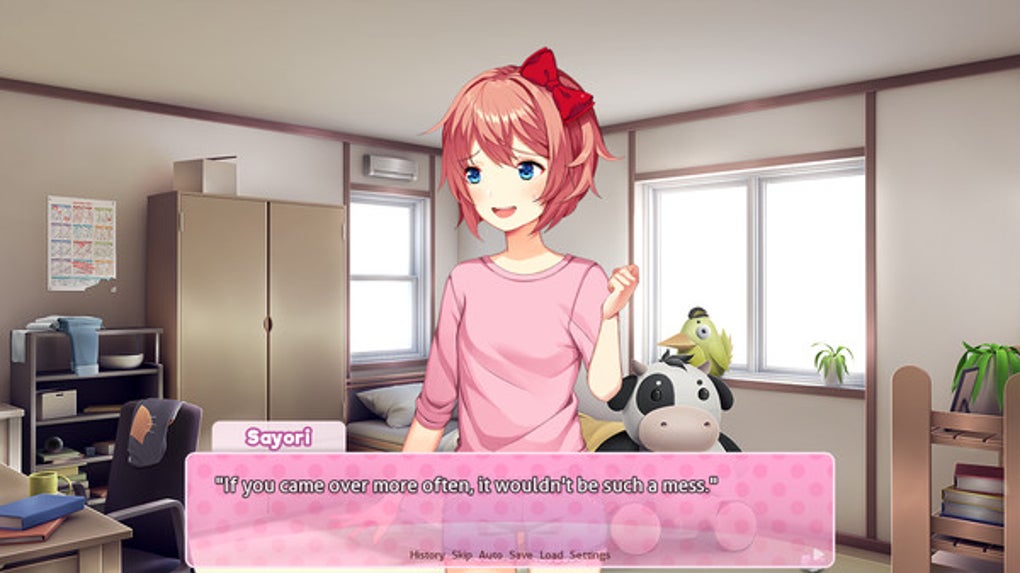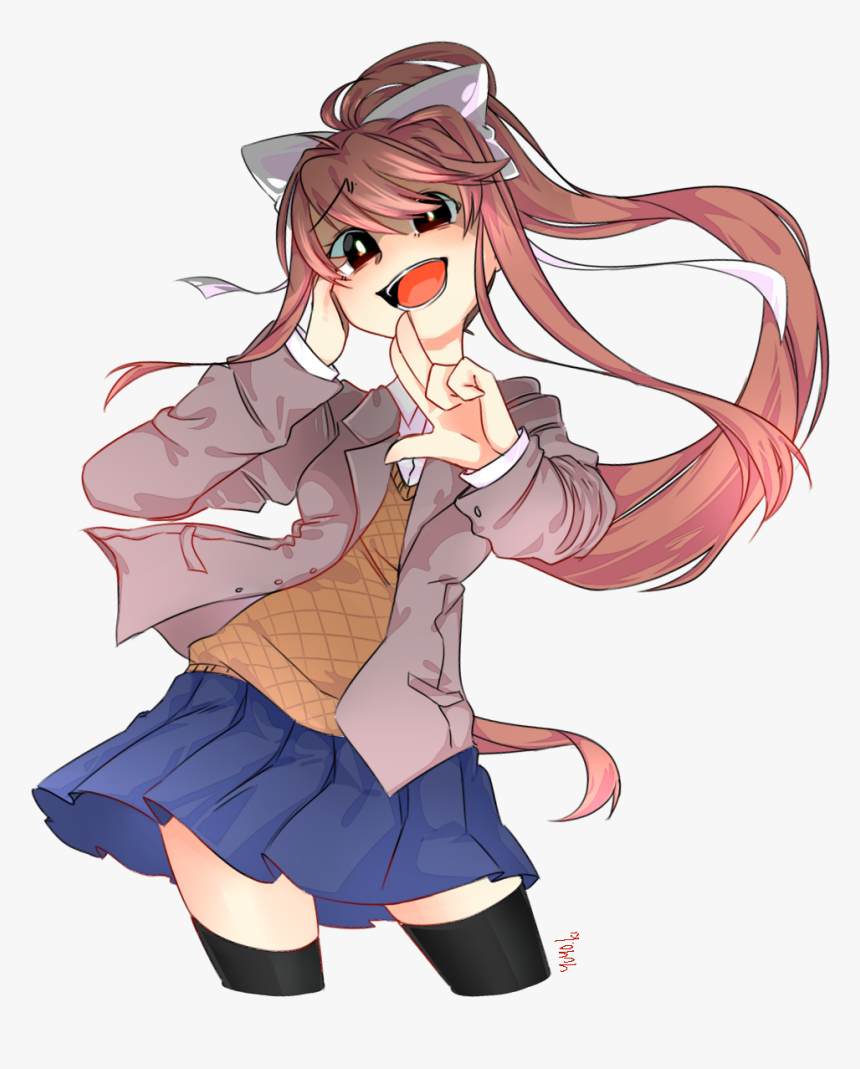
Doki Doki Literature Club Download Free
. WW: September 22, 2017Mode(s)Doki Doki Literature Club! Is a 2017 American developed by Team Salvato for,. The game was initially distributed through, and later became available on. The story follows a male high school student who joins the school's literature club and interacts with its four female members.
The game features a mostly linear story, with some alternative scenes and endings depending on the choices the player makes. While the game appears at first glance to be a lighthearted, it is in fact a game that extensively breaks the.The game was developed in an estimated two-year period by a team led by Dan Salvato, known previously for his modding work for. According to Salvato, the inspiration for the game came from his mixed feelings toward and a fascination for surreal and unsettling experiences. Upon its release, Doki Doki Literature Club! Received positive critical attention for its successful use of horror elements and unconventional nature within the visual novel genre. The prototypical versions of the cast of Doki Doki Literature Club were created by Dan Salvato in a free online program for creating anime characters.Because Salvato lacked artistic skill, he used a free online anime-creation program to create the initial character designs and applied these designs in test versions of the game. Salvato recognized that a product of such quality would not satisfy potential players, so he made a request to his friend, a translator for, for sketches of school uniforms and hairstyles for the characters.
Salvato then handed initial visual development over to Kagefumi, who left the project very early on. After Kagefumi's departure from the project, Salvato contacted the freelance artist Satchel, who created the final character, over the course of a few months. The sprites were created in several parts to give the poses more variety. The background images were originally created as three-dimensional models, and then processed by the artist VelinquenT.Salvato also composed the game's score. The introductory composition, 'Doki Doki Literature Club!'
Doki Doki Literature Club takes the traditional tropes of the horror genre to the next level by breaking the fourth wall. Changing the dynamics of game-player interaction, it subverts the expectations the player has of the game. You will dread every next scene while still manically clicking onward. 3.Open Google Play Store and search Doki Doki Literature Club apps and Download, Or Import Doki Doki Literature Club apk file from your PC Into Android Emulator to install it. 4.Install Doki Doki Literature Club for PC.Now you can play Doki Doki Literature Club on PC.
, is primarily performed by and with accompaniment. The composition 'Okay, Everyone!' Has five different versions, four of which are performed by different musical instruments that represent each of the four female characters. Monika's version emphasizes the piano, Yuri's version uses and, Natsuki's version is played by and, and Sayori's is played. The game's score is generally calm and serene with the exception of two tracks, 'Sayo-nara' and 'Just Monika', which are ominous in tone. 'Your Reality', a vocal song performed over the end credits, is sung by Jillian Ashcraft.Doki Doki Literature Club!
Was first released on September 22, 2017 on, and was later also released on. The game is available as with an optional model. Paying US$10 or more unlocks a bonus 'Fan Pack' that includes desktop and mobile wallpapers, the game's official soundtrack, and a digital concept art booklet. The game's soundtrack was released on two respectively consisting of 15 and 10 tracks. The first CD contains all the main compositions of the game, while the second consists of and alternative.
The soundtrack saw another release by on 'crimson smoke' in the first quarter of 2019. Reception ReceptionAggregate scoreAggregatorScore78/100Review scoresPublicationScore18/20GameGrin8.5/10Quarter to ThreeRPGFan90%AwardsPublicationAwardBest PC Game of 2017 (People's Choice)Matthew Crump Cultural Innovation AwardIn its first three months of release, Doki Doki Literature Club!
Was downloaded over one million times, and exceeded two million downloads about a month later. List of gothic cathedrals. The game was received positively by critics, and accumulated a score of 78/100 on Metacritic based on 7 reviews.Steven T. Wright of described the game as 'a post-modern love letter to the genre it represents', and compared its deconstructive quality to. Robert Fenner of RPGFan noted that traditionally, major visual novel developers such as and produced lengthy day-by-day narratives of a standard anime protagonist's relationships with their supporting cast. According to Fenner, previous attempts to revise the format, such as and, could not escape the conventions of their genre and fully reveal their dramatic potential. He then declared that Doki Doki Literature Club! Had succeeded in this field by making unusual use of the engine and providing unexpected plot twists.Reviewers emphasized that the game achieves its surprising impact on the player due to its outward resemblance to typical games: it has a pronounced anime style in its character design, and the game's goal is to develop a relationship with one of the characters.
In addition, the characters consist of anime stereotypes whose behavior is sparsely displayed through their sprites, and the game's musical accompaniment is light, bouncy, gentle and playful. According to critics, these aspects combined to create the impression of a standard visual novel that would prompt the player to become attached to the characters. VisualNovelist of positively compared the game's visual quality to, another independent visual novel with the appearance of a professional production.
Reviewers pointed out that the game's horror was built on the destruction of a sense of control over what happens in the game and the feeling of helplessness that stems from the distortions in the game's world. Victoria Rose of stated that this approach was strikingly different from traditional horror games and films, where the viewer remains alienated from what is happening on the screen.
Amy Josuweit of noted that while earlier visual novels have broken the fourth wall by crashing the client or adding extra files, Doki Doki Literature Club! Changed the angle by deliberately destroying files rather than adding them.' S Tom Philip commented that at times the narrative felt like 'a slog, clicking through endless amounts of inane, flirty conversation about poetry.'
Fenner opined that the game did not pass the and positioned the protagonist as a seductive casanova. However, he emphasized that the plot is ultimately a 'sharply aware polemic against harem anime/visual novels' in which 'the lengths the ladies go to are not wholly because of the protagonist, but rather he can be read as a symptom—an easy outlet.' Fenner also felt that the game, like before it, 'appears to veer dangerously close to fetishization of very real issues'. Nevertheless, reviewers recognized the game's plot focus as successful and relevant.At 's Best of 2017 Awards, the game won the People's Choice Award each for 'Best PC Game', 'Best Adventure Game' (for which it was also a runner-up), 'Best Story', and 'Most Innovative'. The game won the 'Matthew Crump Cultural Innovation Award' and was nominated for 'Trending Game of the Year' at the 2018.
Ranked the game 16th in their list of the 25 Best Games of 2017. Satchely (June 1, 2019). ^ Satchely (June 2, 2019). ^ Fenner, Robert (December 24, 2017). From the original on October 6, 2018. Retrieved February 5, 2018. ^ Wright, Steven (October 26, 2017).
From the original on October 27, 2017. Retrieved October 26, 2017. ^ Clarke, Billy (February 14, 2018). From the original on June 13, 2018. Retrieved March 30, 2019. ^ Tamburro, Paul (November 28, 2017). From the original on January 9, 2018.
Retrieved March 30, 2019. ^ Fujita, Shōhei (March 4, 2018). (in Japanese). From the original on June 26, 2018.
Retrieved March 30, 2019. ^ Josuweit, Amy (October 31, 2017). From the original on October 25, 2018. Retrieved October 31, 2017.
Couture, Joel (October 13, 2017). From the original on August 16, 2018. Retrieved October 18, 2017. ^ Lineham, Mitch Jay (February 16, 2018).
From the original on October 5, 2018. Retrieved March 30, 2019. ^ Rose, Victoria (October 22, 2017). From the original on October 23, 2017.
Retrieved February 6, 2017. ^ Jackson, Gita (October 11, 2017). From the original on October 31, 2018. Retrieved October 18, 2017. ^ Payne, Jamie (December 7, 2017).
From the original on October 2, 2018. Retrieved March 30, 2019. Bell, Larryn (January 3, 2018). From the original on October 2, 2018. Retrieved March 30, 2019. ^ Jackson, Gita (October 20, 2017).
From the original on October 21, 2017. Retrieved October 29, 2017. Good, Owen (September 13, 2015). From the original on June 26, 2018.
Retrieved October 18, 2017. Blain, Louise (October 9, 2015). From the original on June 26, 2018.
Retrieved October 18, 2017. September 21, 2017.
From the original on June 26, 2018. Retrieved October 18, 2017. Salvato, Dan (2017) Doki Doki Literature Club! Concept Art Booklet, p. 3. Salvato, Dan (2017) Doki Doki Literature Club!
Concept Art Booklet, p. 4. ^ Salvato, Dan (2017) Doki Doki Literature Club!
Concept Art Booklet, p. 5. Salvato, Dan (2017) Doki Doki Literature Club! Concept Art Booklet, p.
11. Salvato, Dan (2017) Doki Doki Literature Club! Concept Art Booklet, p. 18. Salvato, Dan (2017) Doki Doki Literature Club! Concept Art Booklet, p. 20.
^ Team Salvato (September 22, 2017). Doki Doki Literature Club!
Level/area: End credits. ^ Gaspar, Marcos (September 22, 2017). RPGFan Music. From the original on October 8, 2018. Retrieved March 30, 2019. From the original on September 7, 2018.
Retrieved October 18, 2017. From the original on March 31, 2019. Retrieved October 18, 2017. Estrada, Marcus (September 19, 2018). Hardcore Gamer. From the original on October 8, 2018. Retrieved March 30, 2019.
^. From the original on February 15, 2018. Retrieved February 21, 2018.
^ VisualNovelist (November 19, 2017). From the original on February 27, 2018. Retrieved April 1, 2019. Chick, Tom (January 18, 2018). Quarter to Three. From the original on October 6, 2018. Retrieved April 1, 2019.
^. December 20, 2017. From the original on June 12, 2018. Retrieved January 2, 2018. ^ IGN Studios (March 17, 2018). From the original on March 18, 2018.
Retrieved March 18, 2018. Barnett, Brian (December 11, 2017). From the original on December 16, 2017.

Retrieved December 16, 2017. Jones, Ali (January 15, 2018). From the original on August 28, 2018.
Retrieved January 15, 2018. Philip, Tom (October 19, 2017). From the original on June 12, 2018. Retrieved October 19, 2017. December 20, 2017. From the original on December 23, 2017. Retrieved January 2, 2018.
December 20, 2017. From the original on January 1, 2018. Retrieved January 2, 2018. December 20, 2017. From the original on January 2, 2018.
Retrieved January 2, 2018. McNeill, Andrew (January 31, 2018). From the original on February 2, 2018. Retrieved February 2, 2018. EGM staff (December 28, 2017).
Archived from on June 12, 2018. Retrieved January 14, 2018.External links. at The Visual Novel Database.